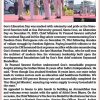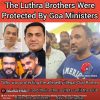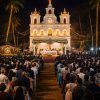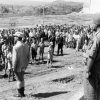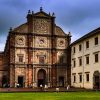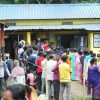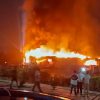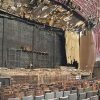Goa is abuzz with excitement as vintage bike and car owners, users, collectors and fans are decking […]
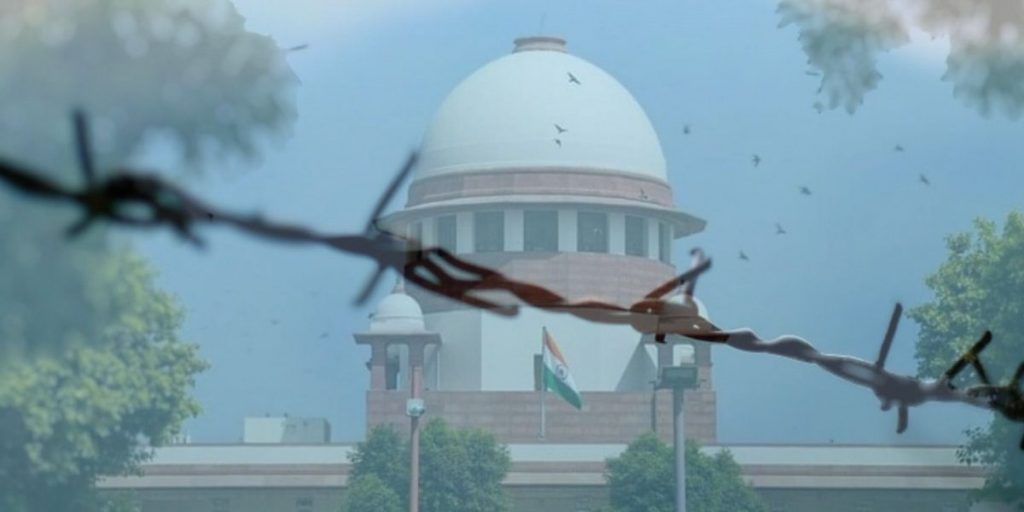
LOOKING BEYOND POLITICS, CONSTITUTION AND LAW! By Upendra Kaul
In the News, Jan 06 Jan 12 2024 January 5, 2024The Supreme Court. A portion of a concertina wire in Kashmir is in the foreground.
By Upendra Kaul
The Supreme Court’s decision to uphold the abrogation of Article 370 has been welcomed by those in the mainland. What about the people of Jammu and Kashmir? A doctor shares his views.
The Supreme Court has confirmed the proclamation made on August 5, 2019 to read down Article 370. This has been welcomed by a majority of those in the mainland. But who cares about the people in Jammu and Kashmir? Though its constitutional validity is still being debated by some well-known legal luminaries, including former judges, the highest court of the country has given its final verdict and it is unlikely to face any challenge.
Setting aside politics, constitution and law, there’s a human aspect to consider: How do the 1.6 crore people of J&K feel about the decision and the Supreme Court’s move uphold it? Unfortunately, the media is silent on this aspect.
I spoke to many people and their families across districts. As their doctor for several decades and having earned their trust, they spoke their heart out. Their feelings and emotions are summed up in this article.
After Maharaja Hari Singh’s rule came to an end with conditional accession to India in October 1947, Kashmiris in general have been a calm and content people. Everybody has a house to live in, adequate clothes to wear and enough to eat, and villagers have a piece of agricultural land too, thanks to the revolutionary land reforms by its first Prime Minister Sheikh Mohammed Abdullah. People were happy that they were not made to join Pakistan, and had a reasonably comfortable relationship with India with their identity intact.
The people of the Kashmir valley, the most well-known part of J&K, are an Indo-Aryan ethnolinguistic group who speak the Kashmiri language. The language has its origin in Dardic with words from Sanskrit, Persian and Punjabi mixed together. The predominant religion of the valley today is Islam but it was not so always. It used to be Buddhism, taken over by Shaivism in 9th century. Islam took roots during 13th to 15th century and today Kashmir is predominantly Muslim. Kashmiri Pandits, a minority with around 120,000 population, were living in great harmony with the Muslims in the valley till the unfortunate exodus of some 100,000 persons in 1990.
Other religions like Sikhism and Christianity constitute at the most 1.5% of the population. The people had their chosen representatives, and there were political spaces to express collective feelings. Above all, the Kashmiri identity, which meant and means a lot to a Kashmiri, stayed unharmed.
Came August 2019, and the announcement was made; the special status given to Kashmir was taken away. A high and mighty hand of Delhi was all that it needed. All means of communication were severed; people virtually locked in their homes. Their fault, exactly none. And it lasted for months, giving Kashmiris the first taste of the things to come. The legislative assembly was dissolved well before the special status was annulled. Thousands of Kashmiris were jailed and many are still languishing there.
Political leaders were arrested in their homes and all political activities banished. The resilient Kashmiris in the city, towns and villages survived all this, facing serious difficulties including access to high-end medical care. The newly posted bureaucrats, invariably from outside the valley, were made to administer various departments. Understandably, they had very little idea of the needs of the locals especially during inclement weather conditions and difficult times. Acute shortages of electricity, snow blocking roads to the interiors and sometimes even shortage of food items in the markets – these were just some of the things Kashmiris had to endure. People were strongly discouraged from expressing their views on these matters and prompt punitive action was taken against those who did. The local press was severely censored and threatened of dire consequences. This was post-abrogation Kashmir.
The much talked about development and progress has not really reached the common man. Yes, the airport road has improved, signboards are better and tri-colour lights adorn the roads. But the houses along the roads are starved of electricity. The ‘Smart City’ concept has only translated to changed pavement tiles of some posh shopping areas, illuminating one side of the famous bund on Jhelum and replacing the ghantaghar at the well-known Lal chowk.
There have been some positive developments under the new administration: no stone pelting, no strikes, school and college exams happening on time etc. After the pandemic restrictions were lifted, a large number of tourists came to the valley helping those directly or indirectly connected with this business.
These however are half-hearted measures of development. The much talked about investors and industrialists coming to the UT with mega projects, bringing jobs and prosperity, continues to be a dream. Educated, bright youth have a darkness to face with very few suitable jobs. Their parents do not want them to go out to different parts of India as they apprehend harm in a hate-filled atmosphere in India for Muslims. As a weekly visitor to my home in Srinagar, and also to my Heart Centre in a village in Pulwama district, I have been a witness to these developments over the last few years. However, this winter I have experienced the misery of people in Kashmir as the valley reels in darkness. Prolonged power outages and freezing temperatures – just imagine the plight. Understandably, many people want to move to Jammu for a few months.
The common Kashmiri, in spite of all the developments around the globe, is still dependant on a phiran (a long loose robe worn by Kashmiris) and kangdi (the earthen heat pot) for keeping themselves warm. These products are still in abundant use even after 500 years of their introduction by the Mughals and are real saviours because of a perpetual shortage of electricity during the winter months.
A fair question, then, is: If there has been unprecedented development in the region and people are immensely happy with the abrogation – as is being propagated – why has statehood to J&K not been restored? Why are there no signs of a free and fair election even after four years of being under bureaucratic rule?
These questions beg an answer.
Upendra Kaul is a Kashmiri cardiologist. He is a recipient of the Padma Shri and the Dr B.C. Roy Award.
Courtesy: The Wire
